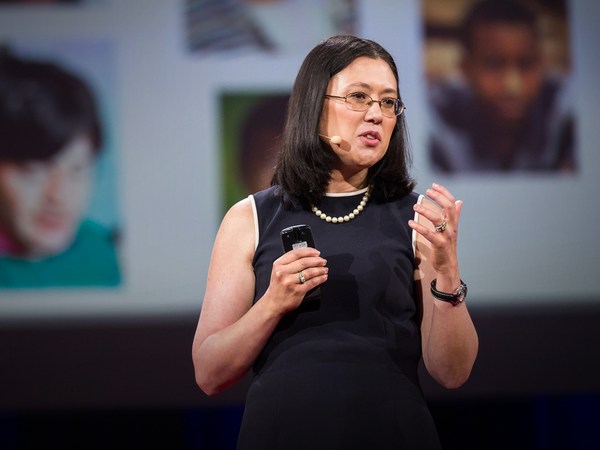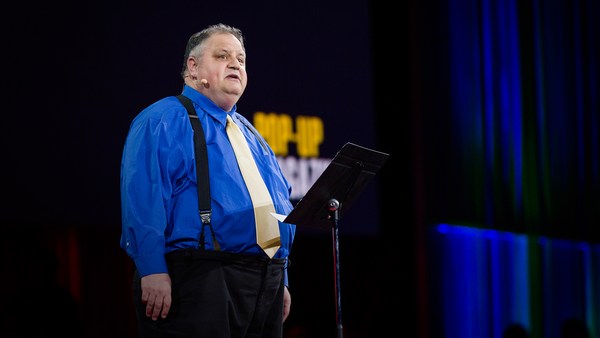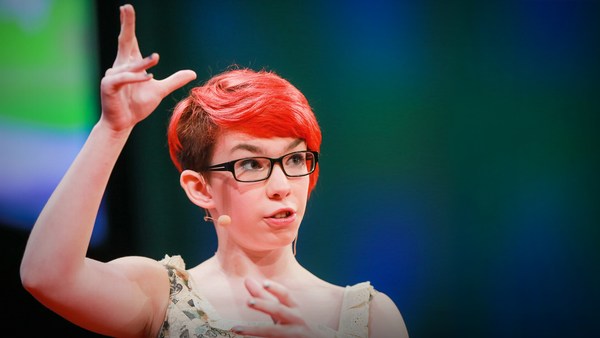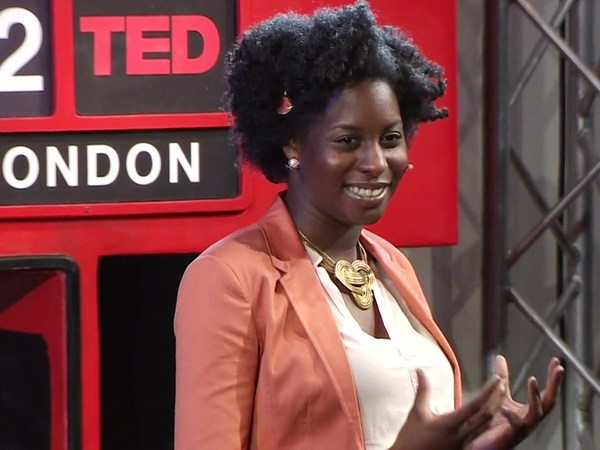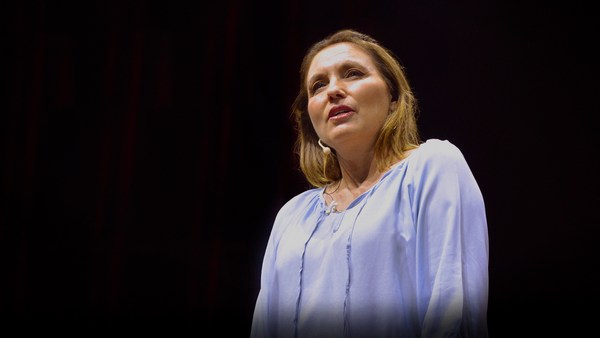As a young woman, I've had some pretty cool opportunities. One that I'm most proud of is having my art displayed at the DMA before I turned 17. When I was in the auditorium with all the other young artists being honored for our achievements, I couldn't think of how proud I was of myself. All I could think about was the velvet upholstery of the chairs touching the back of my arms and legs. For me, the sensation of touching velvet is unbearable. You may be thinking, "I don't like certain textures either," but there's more to this story you need to know. I’m Kate Kahle. I’m 20 years old, and I’m autistic.
When I was a freshman in high school, my family noticed that I was having difficulty connecting with my peers. I had also developed severe anxiety, and it showed up in unexpected ways. I had always had autistic traits and struggles, but I just thought I was weird. My parents took me in for an evaluation where we learned I was autistic. We were all shocked because I'm not what people would typically think of as an autistic person.
Autism is diagnosed when social expectations for neurotypical behavior begin to outweigh the person's ability to perform those behaviors. Autism spectrum disorder, or ASD, is a lifelong developmental disability that can cause deficits in communication, social interaction, emotional awareness, and it can cause sensory issues among other symptoms. The reason it's lifelong is that autism is not a disease and it can't be cured. It's a neurodivergency, which means that the autistic brain works differently than the neurotypical brain.
No one is sure why some people have autism. One of the criteria for diagnosis is that symptoms must be present from birth or early childhood, which means that it's not caused by poor diet, bad parenting, vaccinations, and it's not contagious. Evidence has shown that autism can be passed down genetically, which means it may run in families. I found that a lot of neurotypical people, and even some autistic people, struggle with the concept of the autism spectrum. This is partially because I think it's poorly named, but also partly because the way that experts and researchers think about autism is changing all the time as they do more research. In the past, autism had three categories: mild, moderate and severe. Later, it was thought of more as a continuum like this, from high-functioning to low-functioning, with high-functioning also being called Asperger's syndrome.
You may think that as long as a person experiences the same symptoms, what you call their disorder doesn't matter. Here's why I don't prefer the term "Asperger's syndrome." Hans Asperger was a medical doctor and early researcher on autistic kids who he called "autistic psychopaths." He believed in eugenics, and he sent many of the kids that he worked with to the Third Reich's child euthanasia and sterilization programs. While not the Nazis' main targets, autistic people were considered a threat to the Third Reich goal of a genetically pure society. When people use the term "Asperger's syndrome," they're unknowingly reinforcing the idea that autistic people have no value to society. This is why I prefer my disorder be referred to as autism spectrum disorder or autism instead of Asperger's syndrome.
Nowadays the spectrum is thought of more like this. This shows some of the struggles that autistic people can have and the varying degrees to which each person can struggle with those particular issues.
Autism can have many symptoms and may vary widely from person to person. Some symptoms you might think of when you think of autism are struggling to make eye contact, poor communication, sensory issues and obsessing over special interests. But there are also a lot of other symptoms you might never have thought of before, like heightened emotions, making too much eye contact or high affective empathy. A lot of these less commonly thought of symptoms are more common in women and girls with autism.
Here you can see a spectrum that I filled out to reflect my experiences. As you can see, I have lots of sensory issues with textures and sounds, I focus a lot on my special interests, and I have high affective empathy which allows me to easily communicate with others.
After the initial shock of my diagnosis, it began to make a lot of sense. I finally realized why I had struggled to pick up on other people's negative emotions, like when they're sad or frustrated. This affected my relationships for the first 15 years of my life.
I'm very grateful for my diagnosis because it allowed me to understand and accept myself, and I was very lucky to get it. For every four boys diagnosed with autism, only one girl is diagnosed. Studies that have followed children since birth show that the natural ratio of males to females with autism is closer to three to one. The discrepancy between this diagnostic rate and the actual rate of autism between males and females is likely due to the way autism has been defined and studied and the tests used to diagnose it. The tests used to diagnose autism are still based on studies done on white autistic boys, which likely leads to lower and misdiagnosis in women. I would like to add that this is not only an issue for women, but also minorities. White children are 19 percent more likely than Black children and 65 percent more likely than Hispanic children to receive an autism diagnosis. Males who outwardly display mild symptoms of autism are diagnosed on average two years earlier than women who display similar symptoms. This might be because female special interests are generally more socially accepted than male special interests.
When nonautistic people think about autism special interest, the thing that usually comes to mind is trains. I've never had any interest in trains. When I was a kid, my special interest was in insects. The people in my life saw this as just a healthy interest in the sciences, and it was never really flagged as an autistic trait.
While my special interests were an autistic trait that was largely ignored, my other autistic traits were hidden because I was skilled at masking them. Masking is a behavior by which autistic people try to camouflage and seem like they're not autistic. Hearing this for the first time, neurotypical people might think that autistic people are insecure or manipulative for trying to hide our symptoms. This isn't true. The real reason an autistic person would mask is because of a natural human desire to fit in, connect with others and achieve social and professional success. Masking behaviors can include forcing eye contact, mimicking others’ behaviors, expressions and gestures and even memorizing scripts for small talk and common conversations. Some people are more skilled at masking than others. I'm really good at masking and people tell me that all the time, whether they know it or not. When someone says to me that they never would have known I was autistic if I hadn't told them, or even that I don't seem autistic, what they're really telling me is that I'm good at masking. A lot of people see this as a really positive thing. It's something that allows me to live a "normal" life. And while it's true that some things can be easier when people can't tell you're autistic, it's impossible for a person with ASD to not be heavily affected by it. Autism is a part of us. It colors the way we think, interact with others and see the world throughout our life. This isn't something that can be turned off with masking. It simply gets pushed down to a level below that at which other people can see it.
This pushing down of our true self takes a lot of work. Think about this. When you're having a conversation with somebody, you're doing a lot of things at once. You have the correct posture and the right distance away from them. You're using the right facial expressions. You're modulating your tone. You might be gesturing. You're making the right amount of eye contact. You're not not looking them in the eyes, but you're not looking them in the eyes so much that it's creepy.
(Laughter)
And you're predicting what the other person is going to say and do next. For neurotypical people, all of these things come naturally. You guys don't even have to think about them. But for me, I have to think about all those things at once. Over the years, I've learned how to juggle all of these things, but it's a Herculean task, and for some its complexity makes it impossible.
The difficulty of masking can often lead to secondary mental health challenges. Depression can stem from working so hard and still not being accepted, while anxiety can come from the stress of having to mask for a good portion of the day, every single day, for a good portion of your life, or risk being discriminated against and ostracized. These secondary mental health challenges are of particular issue for women and girls. 34 percent of women with autism have depression, and 36 percent have anxiety.
While these secondary mental health challenges are a big issue, the biggest problem masking causes for autistic people is late and misdiagnoses. If someone is really good at masking, they may never be diagnosed at all. Men and children are the group seen to be least skilled at masking, and they're also the groups diagnosed with autism spectrum disorder most often. Case studies show that women are more skilled at masking, and this is likely a huge factor that contributes to their late and misdiagnoses.
The earlier a person is diagnosed with autism, the earlier they can receive specialized care and treatment that can help them in almost every aspect of their life. Care for autistic people gets better all the time as more research is done, but unfortunately, it's rare to find a therapist or other people who assist autistic people that recognize the extra challenges that come with being a woman. When you struggle socially as a female, learning to succeed socially as a male just isn't enough. Womanhood is a unique and challenging experience all its own. The rules of female friendship, how to talk about romance, menstruation and even how to stay safe from sexual predators are all obstacles that autistic women face but do not receive support for.
While it's tempting in our society to say that gender is something small, obsolete or insignificant, the truth is gender does matter. And when it comes to autism, it matters a lot. The difference comes in with the vast disconnect between the lived experiences of men and women. All autistic people are born autistic, but from birth, girls are thrust into a more socially rigorous environment that increases the pressure to mask and the challenges an autistic person faces daily.
For any autistic person, but especially women and girls, the part of their autism you can see is not what that person is actually experiencing. It's impossible for someone with a limited outside perspective to label someone else's autism, be that label "mild," "moderate," "Asperger's," "high-functioning," or any other label. You can see me up here right now talking to you and try to label me to differentiate me in your mind from another autistic person you may have met, such as maybe a little boy having a sensory meltdown in the mall. You can try to label me in your mind to differentiate us, but the feelings that we're having on the inside are probably more similar than you would think. I've just learned to mask them after years of pressure and practice. This is partially because what society expects of a grown woman is different than what they expect from a little boy, which is reasonable. But society also expects more of a little girl than a little boy. From a young age, girls are expected to have higher emotional intelligence and care more about their peers' emotions than boys. This is reinforced in almost every aspect of their life, from TV shows and toys to the words and actions of family and teachers. Women are better at masking because society expects more from us, and it doesn't make as many allowances for us. Sometimes society will make exceptions for the social deficits of autistic men in exchange for the knowledge and perspective they can bring to the table. But it won't do the same thing for autistic women.
I want you to walk away from this auditorium knowing that autism is not a disease, and it doesn’t need to be cured. It's just a different way some brains can work. If you want to help autistic people, you can support organizations like Autistics for Autistics, Autistic Self Advocacy Network and Autistic Women and Nonbinary Network that support autistic self-love and acceptance, as opposed to organizations that spread fear about autism. You should also identify yourself as an autistic advocate to people in your life. Be understanding and allow friends and family to unmask with you. This is also a call to action for the psychology community to conduct more research on autism in women, people of color and other minorities.
Most of all, I want you to know that every person with autism is different. I got up here today to share my perspective because I'm not what a lot of people would think of as an autistic person. But that doesn't mean that every woman with autism will have the same or even a similar experience to mine. My autism journey is just one out of thousands that can provide insight into the way autistic people think, interact with our society and see the world.
Thank you.
(Applause)
